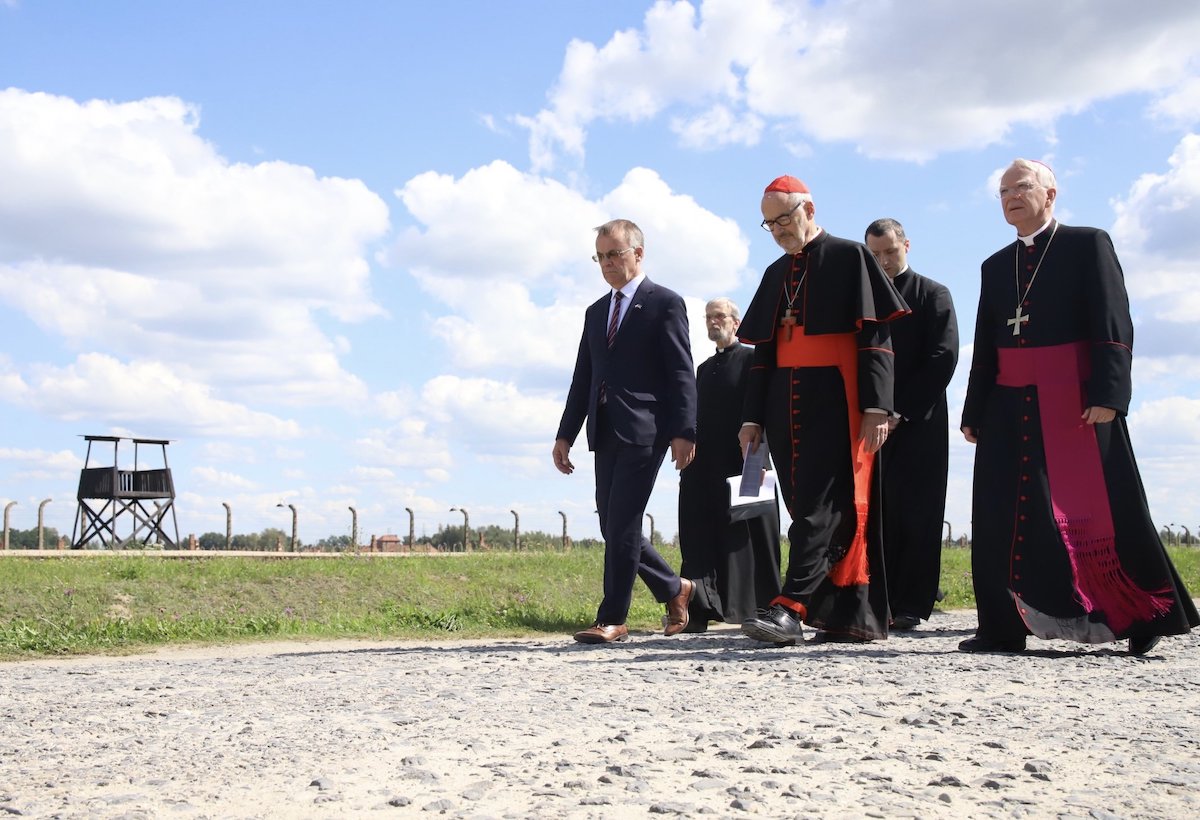By Carol Glatz, Catholic News Service
VATICAN CITY (CNS) — When Canadian Cardinal Michael Czerny visited Auschwitz to commemorate the 80th anniversary of the martyrdom of St. Edith Stein, he also prayed for his grandmother who died there — a Catholic whose parents were born Jewish.
“My mother’s family — both parents and two brothers — were also Catholic but shared the Jewish origins that the enemy abhorred,” he said in his homily Aug. 9.
“My maternal grandmother Anna, my grandfather Hans and my uncles Georg and Karl Robert were all interned in Terezín (a concentration camp near Prague in the Czech Republic), where Hans died. My grandmother and uncles were transported to Auschwitz,” said the cardinal, who is prefect of the Dicastery for Promoting Integral Human Development.
His uncles were later sent to labor camps elsewhere “and eventually murdered there” while his grandmother, Anna, died somewhere at Auschwitz from typhus in May 1945, after the camp had already been liberated and a few months before World War II ended.
“I still do not know where she was buried,” he said at a Mass he celebrated Aug. 9 at a Carmelite convent nearby.
“So Auschwitz links the witness and relics of St. Teresa Benedicta of the Cross (also known as St. Edith Stein) with my grandmother’s story and spirit, wherever her remains may lie,” he said, adding that the two women were about the same age when they were killed.
The saint was born Jewish, converted to Catholicism at the age of 30, became a Discalced Carmelite nun 12 years later, then was arrested and murdered in an Auschwitz gas chamber Aug. 9, 1942.
The cardinal, who was born in the Czech Republic, spoke of his own parents’ suffering and survival.
While they were born and raised Catholic, his mother’s grandparents were born Jewish, which classified his mother, Winifred Czerny, as Jewish by the Nazis.
She was first forced to work near Brno, Czech Republic, then spent one year in prison in Leipzig after she was convicted for theft from the state for not having surrendered some family jewelry to the Nazis, he told Vatican News in 2019. She was sent to the Terezín concentration camp for several months until she was liberated at the end of the war in 1945.
The cardinal’s father, Egon Czerny, did not have Jewish ancestors, so “he was spared Terezín; but, refusing to divorce my mother, he was subjected to forced labor at the camp in Postoloprty, west of Prague and not far from Terezín, for the last eight months of the war,” he said in his homily.
With the war over and his mother and father reunited, the cardinal was born in Brno in 1946, and his brother Robert was born in 1948. However, that same year, “the four of us fled from the European nightmare and found refuge in Canada.” Being granted refuge there had been exceedingly difficult until a high school classmate of his parents sponsored them to settle in Canada.
A few years before the war, his grandmother, Anna, who was an artist, “had done a painting on glass of the Holy Family’s flight into Egypt. It turned out to be a premonition for my immediate family,” the cardinal said.
Cardinal Czerny had the image reproduced on the card commemorating his episcopal ordination and upon becoming cardinal in 2019.
“The phrase on the card comes from the play Dialogues des Carmélites by Georges Bernanos: ‘Whether we are brave or cowardly, only one thing is important: that we always find ourselves where God would have us and, for the rest, to trust in him.'”
Concluding his homily, he prayed, “May those whose personal and family histories are both Jewish and Christian contribute to the necessary dialogue between our faiths so as to live as ‘fratelli tutti,’ siblings all, in our common home.”







